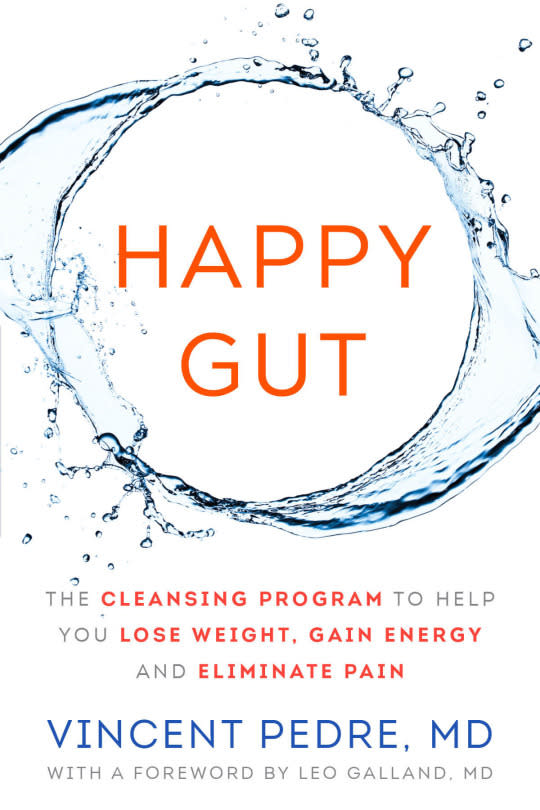Why Happiness Isn't All In Your Head

Your moods may be predicted in a surprising part of your body. (Photo: Getty Images)
Day by day, science seems to be churning out new and exciting revelations about the gut microbiome—the veritable universe of microorganisms that live mostly within our large intestine, impacting our health in profound ways. We’re even getting closer to a true estimate of the number of “bugs” that lie within our gastrointestinal tract (hint: about as many cells as make us human).
A new book, Happy Gut by Vincent Pedre, MD, further explores this marriage of microbiology and wellness. It promises to provide a holistic approach to nurturing your gut, which can be affected by everything from stress to the speed at which you chew your food.
Here’s a sneak peak at Dr. Pedre’s philosophy and approach to treatment:
Max Lugavere: What did you feel was missing from the microbiome conversation?
Dr. Pedre: What’s been missing is a comprehensive mind-body program for rebalancing the gut. While diet is very important, it’s not just about diet. I wanted people to have the right tools to help them end their gut distress and improve their gut-related health issues. If you have an “unhappy” gut, you know it, but people may not realize that other conditions, such as allergies, asthma, fatigue, mental fog, and migraines, are also related to the health of their digestive system.
My [approach] is both a diet and lifestyle program. Often, we focus on one or the other, but I wanted to put everything together, bringing attention to issues such as the importance of drinking clean water, cooking on non-toxic surfaces, and using eco-safe utensils. This 360-degree approach to wellness also involves addressing the mind-body connection. That is why there is a whole chapter devoted to yoga, breathing, and meditation as part of a daily routine to create a happy gut. And finally, I also included a chapter describing recommended tests that can help readers uncover the root causes of the specific symptoms they are experiencing.
Understanding the gut-brain axis is still somewhat in the nascent stages. What surprised you the most when researching Happy Gut?
The research on the microbiome is exploding! For example, we are learning that your circadian rhythm (any biological process that displays an oscillation over a period of 24 hours) can affect the composition of your gut microbiome. In fact, we know that disturbances in your circadian rhythm —such as if you go to sleep too late, wake up too early, work overnight shifts, or never eat on a schedule — will lead to metabolic syndrome and weight gain, which may actually be rooted in changes to your gut microbiome.
If you’re struggling with your weight—reducing stress, getting enough sleep, and eating on a regular schedule can actually have a positive impact on the way your body processes food, which is partly controlled by your gut flora. How amazing is that?
What does optimal gut health feel like? How do you know if it’s not in top shape?
A “happy” gut is one in which food digests well, and the breakdown units of proteins, carbs and fats absorb easily through a gut lining that has just the right amount of permeability, without being hyper-permeable (a condition known as leaky gut syndrome). A healthy gut does its work quietly, without causing pain, bloating, distension, or diarrhea, and where bowel movements occur regularly (at least once a day), producing solid, brown poop.
When you experience abdominal pain, acid reflux, bloating, diarrhea, constipation, and/or feel like you’re pregnant an hour after eating, your gut health is suboptimal. However, if you also experience excessive fatigue, mental fog, inability to concentrate, pain in your muscles, migraines, hyperactivity, depression, joint aches, allergies, skin rashes, or asthma, you may have a disordered gut at the root of those chronic health issues.
Can you have an “unhappy” gut and not know it? (i.e., can you be asymptomatic?)
The short answer is: Yes. In my clinical practice, I often encounter patients that are not aware of gut symptoms, but are showing signs of gut-related conditions. For example, a patient with hives that could not be traced to any environmental exposure or allergy via the standard skin tests, turned out to have a food sensitivity to gluten (wheat) that had increased the permeability of her gut and led to this inflammatory reaction.
She had seen several dermatologists who treated her symptomatically, the way Western medicine often does, without exploring the root cause. She had no digestive complaints, so when I told her food could be at the root of the hives, she was shocked. Having tried everything else, she agreed to a four week trial gluten-free diet. When she returned for follow-up a month later, her hives were gone for the first time in years. For anyone with a chronic condition, you always have to “check under the hood”—in this case, your gut.
How much say does our gut have in our mental health?
New science is showing that our gut bacteria actually produce the same neurotransmitters synthesized in our brain. In fact, more serotonin (the “happy” brain chemical) is produced in the gut than in the brain. And possibly even more remarkable than that is the effect a short-chain fatty acid (SCFA), known as butyrate, produced by beneficial bacteria in the colon, has on the brain.
Check out this chain of command:
You eat the right prebiotic foods (those that feed the “good” bacteria in your gut, like asparagus, onions, garlic, and yacon root), then this happens—
These foods, rich in inulin (a prebiotic) feed one group of bacteria in your colon that produce a set of SCFA’s, known as acetates and lactates,
which feed another set of beneficial butyrate-producing bacteria in your colon (call that your own internal B to B operation),
which then feeds the cells that line the colon (colonocytes), helping them stay healthy,
while some butyrate gets through your gut barrier, then through the blood brain barrier and into your brain,
where it has epigenetic effects—in this case, increasing gene transcription of brain-derived neurotrophic factor (BDNF),
which increases brain plasticity and long-term memory.
So if you want to be happy, mentally sharp, and focused, start with a diet that decreases gut inflammation and feeds your good bacteria.
Related: Psychotherapy Has Surprising Impact for Those With IBS
What are some mood states associated with gut health?
Experiencing rapid mood swings, feeling irritable, anxious, or depressed may all be associated with gut health. Most striking is depression. The root of depression may actually be an inflamed gut, which results in an inflamed brain. Dysbiosis—meaning the overgrowth of pathogenic organisms (bacteria, parasites, and yeast)—may also lead to a depressed or anxious mood. Certain bacteria and yeast produce toxic proteins that may cause irritability, anger, and/or sadness. While higher levels of beneficial bacteria in the gut can reduce anxiety, depression, and even help counter the effects of stress. In one study, prebiotic supplements were found to decrease anxiety by altering the way people process emotional information.
Why have some researchers and physicians begun to refer to the gut as the ‘second brain’?
The gut has the ability to act independently, while also being interdependent with the brain, and each one has the ability to affect the other. From neurotransmitters that affect mood and cognition to toxic proteins that travel up the vagus nerve and accumulate in the brain, leading to the very findings that cause Parkinson’s or Alzheimer’s—chemical messengers produced by the bacteria that live in your gut play a very important role in brain health.
“There is a two-lane superhighway of communication between your gut and your brain.”
The gut also has its own “brain.” The enteric nervous system (the gut’s very own set of neurons), acts independently from the brain, coordinating peristalsis (the smooth muscle contractions that move food from the stomach to the rectum), triggering the release of gut hormones and enzymes, and controlling blood flow to the gut after meals to help the body assimilate nutrients.
What are some things people can eat to enhance their moods through their guts? What should people avoid?
Foods that help promote the healthy bacteria in your gut and an anti-inflammatory state will promote healthy mood states as well. This includes eating vegetables with prebiotic fibers (chicory, asparagus, onions, garlic), foods rich in omega-3 fatty acids, cultured foods (homemade kefir from organic milk or even coconut water), fermented vegetables (kimchi, sauerkraut), and fermented drinks (kombucha). Avoid an excess of inflammatory foods, like poly-unsaturated fatty acids and gluten.
Leaky gut syndrome, resulting from repeated exposures to antibiotics, toxins and/or pesticides, allows partially digested food proteins to enter the system, where they trigger inflammation. Some food particles even form toxic opioid-like metabolites during digestion. These include gluteomorphins from gluten (in wheat) and casomorphins from casein (in milk), which leave the brain feeling like it was drugged with morphine. For many, food sensitivities are a unique signature of foods that cause inflammation, leaving them feeling lousy.
Related: How to Pick the Right Probiotics
You talk a lot about how it’s not just the foods we eat, but how we eat them that matters. Can you give us some tips on how we should be eating?
Start with these three easy steps towards conscious eating:
1. Slow Down
Digestion is a relaxed activity. It may seem intuitive, but in our modern world where everything is fast, we tend to speed through our eating as well. By this I mean you can’t be in a sympathetic “fight-or-flight” mode—what happens when you rush through a meal while still at your desk multitasking your work-related responsibilities—and still digest your food well. Blood will be shunted away from your digestive system in this stressed-out state, leaving the food feeling like a brick in your stomach. Digestion is a parasympathetic activity—this is the part of the autonomic (automatic) nervous system that helps you relax. It is stimulated in activities, such as yoga, deep breathing, and mindfulness (being in the present).
Take time to chew your food. Appreciate where it came from, and even perhaps say a little thank you for the privilege to eat what you are eating. Gratitude should be a daily occurrence, not just something you say on Thanksgiving. Expressing gratitude is another way to bring your body into that parasympathetic state.
2. Eat in Community
We are social beings, as exemplified by the immense popularity of Facebook and other online communities. However, no level of electronic engagement can supersede the grounding, endorphin-promoting effect of sitting down and eating in community— it’s one of the oldest rituals. Eating with friends promotes good digestion. You also eat more slowly when engaged in conversation, allowing time to feel full so you don’t overeat.
3. Stop at Three-Quarters
My last tip is meant to help you avoid over-eating to the point where you feel uncomfortably full. Pay attention to how much you have eaten, and when you are seventy-five percent full, stop eating. Wait a few minutes to give time for your stomach to communicate with your brain how full it really is. You can have a little more after a couple of minutes, but you may actually find you are quite satisfied and don’t need to eat more.
